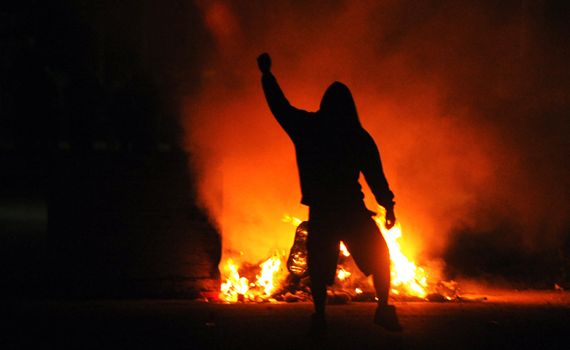Mass arrests follow Bulgaria violence
Police detain 127 people after clashes between Bulgarian and Roma communities in southern village of Katunitsa .

 |
| Several houses were set ablaze as riots broke out in the southern village of Katunitsa [AFP] |
Bulgarian authorities have detained at least 127 people after ethnic clashes broke out in the south of the country following a fatal road accident involving relatives of a Roma leader.
Police and elite national troops patrolled the streets of Katunitsa village in the country’s second-largest city of Plovdiv over the weekend after several houses were set alight and cars owned by a local Roma clan leader were trashed.
Keep reading
list of 4 itemsAs Israel attacked Gaza’s north, 26 members of his family were wiped out
What is Trident, the US floating pier off Gaza? Will it work?
Does Israel’s Netanyahu have a plan for a ‘day after’ the war on Gaza?
The clashes between the Bulgarian and Roma communities were ignited on Friday night when a 19-year-old man was struck and killed by a mini-bus driven by a man linked to Kiril Rashkov, a local self-proclaimed “Gypsy Tsar”.
The Bulgarian state news agency BTA reported that three policemen and two civilians were hurt in the violence, while a 16-year-old at the scene who suffered from heart problems was taken to hospital, where he later died.
Ingredients for violence
Dimitar Mulchev, a local councillor, said that the ingredients for violence have been around for decades.
“The clashes happened because of the indifference of state institutions over the past 20 years. Villagers have been threatened with murder so many times by Kiril Rashkov, and it’s always on an ethnic basis.”
More than 500 angry residents gathered in front of one of Rashkov’s houses and called for him and his family to be thrown out of the village, which has a population of 2,300.
Rashkov, 69, known as “Tsar Kiro”, was convicted several times during pre-1990 Communist times for illegal foreign exchange and gold transactions.
In 1998, he founded a political party that aimed to facilitate the entry of Roma gypsies into political and economic life.
Defusing tensions
Todor Chonov, the director of Plovdiv police, said it was important to encourage calm and defuse tensions.
“All this happened because of the situation in this village over the past 20 years, the conflict between the Rashkov family and the people.
“Now we have several crimes that we are working on. The most important thing is to keep law and order and the people of Katunitsa helped us detain those hooligans from yesterday.”
Since joining the European Union in 2007, Bulgaria has failed to convince other EU states of the effectiveness of its anti-corruption reforms, particularly in relation to organised crime.